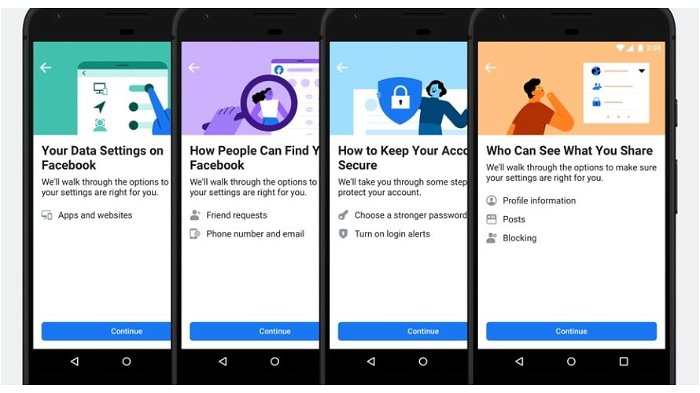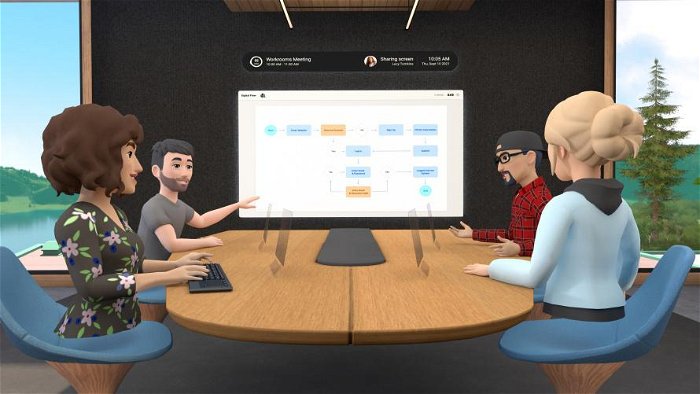The tech company’s latest annual keynote hit the hardest with a rebrand. It took four letters to overtake the household Facebook name. Now, the Meta brand would guide users and countless developers into a sci-fi direction. Starting with the use of Virtual, Augmented and Mixed Realities (VR/AR/MR). The 90-minute presentation laid out the flashy promises for a digital way of life. So much that users can put on a headset for bigger face-to-face connections.
There’s a clear science-fiction picture in mind for Facebook. But I never expected one of the world’s largest digital companies to download its future into a headset. The 2021 keynote felt like a feature-length marriage proposal to take Facebook’s big user base into the Metaverse. The keynote laid out enough steps to build a digital way of life. But barely an answer on how billions of users can trust Meta enough to put a headset on.
A Rift and two Quests later, I’ve seen the possibilities of how a Metaverse can connect every user, but never enough about how Facebook planned on taking Oculus out of its gamified roots. Building VR worlds is a system that naturally works in video games. From designing Metaverse locations like levels, structuring avatar customizations like an RPG, the 3D spaces open up dream-like spaces users can’t have outside of VR. Of course, VR gives users abilities and chances to be the best versions of themselves. Much of the Metaverse is inspired by game design, down to concepts introduced in your favourite works of fiction.

It’s no secret that I’ve been keeping an eye on VR since 2016. There has been a steady flow of content thanks to Facebook’s extra help with Oculus. VR gamers would only see a win with Meta’s exclusive AAA pipeline. Starting with Resident Evil 4, it sets a new model for making VR a dream machine, along with being inside games like Grand Theft Auto: San Andreas instead of peering through a TV screen. VR is noticeably easier to join in 2021, as cables and a $1000 price tag are gone.
Even without needing a PC or complicated setup before making the jump to VR. This only piques a public interest for the technology, starting with Meta’s prime focus for VR/AR/MR and legitimizing things further. For VR consumers, things are improving for mass adoption.
“The keynote laid out enough steps to build a digital way of life. But barely an answer on how billions of users can trust Meta enough to put a headset on.”
Surprisingly, only a handful of games were highlighted in Meta’s keynote. Most attention went to the non-gaming ways users could use VR/AR/MR. Rather, how users enter mass adoption under the Meta’s rules. Nervously, it means existing under Facebook’s image of a digital life once they break out of gaming’s department. Raising questions about agency when existing inside a company’s digital space.

My nerves come with a shared concern about Facebook’s private data collection, enabling misbehaviour online and fostering alternative information sources. These aspects don’t translate much around Meta’s pipeline for AAA games. The VR gaming realm exists with a safety net of pure fiction. But turning Facebook’s platform into a living and breathing universe comes with inevitable spots where good could become better, and bad things might get worse.
Facebook could have picked a better time to launch a rebrand. The news comes with a cautious optimism for those still interested in VR. One being Meta’s acknowledgement to make their digital space accessible for everyone. But it’s hard to realize this as more scepticism grows over Facebook’s responsibility around information.
The company’s practices were put towards the U.S. senate earlier in October 2021, following a mass release of internal documents. Research, put forward by whistle-blower and former company product manager Frances Haugen, highlighted the implications Facebook’s platforms had on younger audiences. Particularly with offending content, misinformation around world events and cyberbullying. Despite the company’s own measures, Haugen claimed there were “strong national security concerns” around Facebook’s A.I. and what it can’t pick up.
Meta would have to take concrete measures with Facebook’s privacy. Trust is the key to bringing wider audiences on board the VR/AR/MR train. No doubt, its technology is prospective for connecting individuals to inclusive and private spaces. But there’s a bigger hesitation among critics for just which brand is paving this future forward. It’s fair to question Facebook’s handling of personal data – as every user is right for constantly doing. Better yet, Meta’s announcement only highlights what more needs to be done before Facebook and Oculus undergo extreme changes.
Oculus’ VR platform planted the seeds for the Metaverse, starting with its suite of social and home apps. As the Meta presentation laid out, all users get a private space. Along with ways to chat about anything with their connections. In VR, the Horizon Home app is an instant gateway into the Metaverse.
Clearly, it’s inspired by Facebook’s idea for freedom. From customizing a room’s interior decorations to moving furniture, then customizing clothes and appearance to your own liking. It’s the meta version of creating a profile on Facebook. Tied to an account’s evolving interests and other data to best suit users in the Metaverse. Users get agency, which is made more visually apparent under Meta’s utopia.
Beyond games, the Metaverse would only thrive if users are willing to share their identities on a more personal level than ever. Especially among families or a diverse number of users with different backgrounds and beliefs. It’s definitely a contrast to Meta’s gaming content, which puts users in new characters.
More often, without a worry of putting your digital footprint forward in the Metaverse. Resident Evil 4 VR feels like the first real product from Meta, even before its rebranding. The game has survived across different consoles since 2005. But Oculus’ VR-first approach radically set the bar for future games to follow. There’s barely a tutorial needed for grabbing objects, firing a weapon, or opening doors. As it should be for realistic gaming experiences in VR.

Meta’s extra budgeting benefits non-social experiences, including $150 million earmarked for educational apps and job training simulations. If gaming is enough to fuel mass adoption, VR/AR/MR can see bonus progress elsewhere. That level of trust teeters on how much control Oculus/Facebook has over these exclusive experiences. Obviously, as Facebook exercised near-complete control to make Resident Evil 4 VR a killer app for Quest 2.
“Meta’s extra budgeting benefits non-social experiences, including $150 million earmarked for educational apps and job training simulations.”
At the very least, VR games are still reliant on third-party studios like Capcom and Rockstar Games. Meta’s current pipeline for single player VR experiences are tied less to that online ecosystem. On the hardware front, some gamers looking to adopt VR in 2021 won’t need the Facebook account. According to Meta’s keynote, the controversial barrier would be removed to let users unlink their accounts. It’s a silver lining as Facebook takes one step in rebuilding trust. In the face of keeping users interested to push for mass VR adoption. Obviously, having an account is pivotal to being a part of the Metaverse. This requirement alone would keep some users deactivated or logged off amid Facebook’s controversy.

Much to no one’s surprise, there are blind spots with wellbeing across Instagram, WhatsApp, and the main Facebook social media platforms. Things which Facebook employees reportedly overlooked due to understaffing and keeping a healthy traffic for boosting revenue. Haugen’s concerns aren’t new for audiences using Facebook’s platforms. These have long been perpetuated with its role of dispersing information across the 2016 U.S. Presidential Election. Including Zuckerberg’s unwavering message of fostering remote connections in his Senate hearings soon after.
The Metaverse doesn’t shake off the mistakes made in 2018’s Cambridge Analytica scandal. Both an eye-opening discovery for billions of users worldwide and much to Facebook’s pushback. The analytics, harvested from almost 87 million Facebook profiles, would find keywords and behavioural patterns. Then contribute the data with targeted ads and content. There’s no doubt Meta’s announcement echoed back to Facebook’s vulnerabilities in its finest hour. The Metaverse aims to foster a materialized version of what Facebook’s accomplished since it started in the early 2000’s. But oversight on Facebook, WhatsApp and Instagram concerns would add more unknowns with a Metaverse.
“There’s no doubt Meta’s announcement echoed back to Facebook’s vulnerabilities in its finest hour.”
As founder and CEO Mark Zuckerberg wrote with his Meta reveal, its digital space requires “new forms of governance.” But how this is laid out across the Metaverse is still unknown. Here, Meta’s fresh start has the potential to collaborate. It’s a radically different approach from Facebook’s internal start-up approach. Instead, the Metaverse could grow and foster that new space with trusted voices.

Resident Evil 4 VR is much more important for Meta’s collaborative approach. Only because it showcases an openness to listen to VR users. Then deliver a fan-favourite with Resident Evil 4’s best qualities intact. There’s a clear sign of life among Facebook’s higher ups to allow such collaborative projects to exist. Giving Meta more potential with listening to a concerned chunk among billions of users in Facebook’s platforms.
It’s hard to imagine the birth of the Metaverse without seeing Facebook’s desire to move on. But it takes more than a rebranding and increased support for existing VR platforms. Sure, the announced Project Cambria VR/AR/MR headset is needed. AAA game support will keep existing VR gamers going. Meta must be different from Facebook, as Zuckerberg boldly suggested for his “new north star” at the anticipated end of his keynote.
There’s a crucial focus for Meta to keep in mind when leaving Facebook’s brand behind. Its Metaverse can’t work without mass adoption for VR/AR/MR under the company’s new image. The foundations for rooms, open venues and thriving meeting rooms are there. But these spaces don’t work without bringing everyone on board. Trust is a bigger requirement for Meta to work beyond gaming. Which begins by admitting how long Facebook’s laundry list is.
You can watch the full Meta keynote below:






